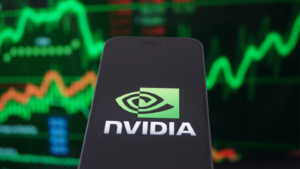Artificial intelligence (AI) stocks have been among the best performers on the Nasdaq since the release of ChatGPT at the start of 2023. Despite the recent volatility caused by traders pricing in elevated interest rates for the long term, AI companies will likely continue to innovate and grow their revenues and profits.
While AI transforms a plethora of industries, from healthcare to entertainment, equities investors will have a number of opportunities to explore.
Below are three explosive AI stocks that have the potential to make patient, long term investors rich in the long run.
Nvidia (NVDA)

Despite Nvidia (NASDAQ:NVDA) already having undisputed leadership in artificial-intelligence hardware, investing now could still bring ample gains to investors. Even an ongoing slump in the semiconductor market could prevent Nvidia from achieving record beating earnings in 2023 due to the robust demand for server GPUs and AI-powering chips. In particular, Nvidia’s A100 and H100 chips, which power the elaborate large language models (LLMs) used to train AI models that drive advanced applications, have continued to sell like hot cakes.
The graphics chipmaker’s GPUs power some of the most advanced AI systems in the world, such as self-driving cars, cloud computing and conversation bots like ChatGPT. To complement its advanced hardware solutions, Nvidia also develops its own AI software platforms, such as CUDA and TensorRT, which enable developers to create and deploy AI applications and solutions.
Nvidia’s shares have quadrupled since the start of the year, and recent market volatility has created a potentially attractive entry point for interested investors. The graphics chipmaker was trading at a forward price-to-earnings ratio of 48.1x in late August, but trading multiples have fallen to 29.6x forward earnings. Investors should definitely take notice.
UiPath (PATH)

UiPath (NYSE:PATH) is the leader in robotic process automation (RPA), which is a form of AI that automates repetitive and mundane tasks. In essence, the UiPath Business Automation Platform enables professionals to quickly build automations for both existing and new processes made up of a myriad of tasks using software “robots.” The tasks PATH’s tech can perform range from simply logging into applications or moving folders to extracting information from documents along with updating information fields and databases. UiPath also offers a range of AI-powered tools and services, such as UiPath Automation Hub, UiPath Insights and UiPath Apps.
With UiPath having already passed the $1 billion in annual sales mark in fiscal 2023 (which ended on Jan. 31), there is a lot to be hopeful about in terms of this company’s growth trajectory. The RPA stock was also hit during the September slump and thus trades at cheaper forward-looking EBITDA multiple of 33.4x. For investors looking for exposure to business automation tools, UiPath might be a stock worth looking at.
Symbotic (SYM)

Symbotic (NASDAQ:SYM) is a leader in autonomous warehouse solutions, which use AI to optimize the storage, retrieval, and transportation of goods. Symbotic’s warehouse solutions consist of software, robots, and racks that work together to increase the speed, accuracy, and flexibility of warehouse operations. While SYM’s revenue has doubled consecutively since 2020, management expects there to be more recurring revenue and, therefore, top-line predictability as more products are deployed.
Supply chain management (SCM) software is still a nascent field, but pandemic-induced supply chain disruptions catapulted a number of efficient solutions out of relative obscurity. Besides SCM being a $20 billion industry, there is still much less adoption amongst retailers versus other industries. According to a Gartner survey, there is currently only a 42% adoption rate amongst retailers, which indicates there is a lot of white space in SCM software, especially for retail-focused players like Symbotic.
Similar to the entries above, Symbotic has settled at a more reasonable EBITDA multiple of 23.1x after the September market rout. This should incentivize investors who want to benefit from disruptions in an industry ready for AI and automation.
On the date of publication, Tyrik Torres did not hold (either directly or indirectly) any positions in the securities mentioned in this article. The opinions expressed in this article are those of the writer, subject to the InvestorPlace.com Publishing Guidelines.
